- Home
- Alan Scholefield
Never Die in January (A Macrae and Silver Mystery Book 2) Page 11
Never Die in January (A Macrae and Silver Mystery Book 2) Read online
Page 11
“Why would — ?”
Manfred played a few bars of another piece. “Satie. Vexations. You can play it for ever, but it is all repeats.”
“Would you like some coffee?”
He ignored her. “They want long pieces? I can give them long pieces.” He began to play.
It sounded to Zoe as though he was playing a series of studies by Czerny. He played first with one hand, then the other, then both together. He did “shakes” and arpeggios. She began to feel he was making it up as he went along to pay her back for the Vienna chicken.
He played for an hour. Zoe’s bottom became numb. She fought sleep, anger, and despair. She felt that at any moment she would fall off the chair and foam at the mouth.
Where was Leo?
Manfred played on. He played roulades, he played a series of octaves in contrary motion, he played allegro vivace, he played allegro con fuoco, he played lento, he played —
Miraculously, the phone rang. She leapt from the chair and ran to the next room.
“Who is it?” Manfred said.
“A Mrs Benjamin. She says Morris is sick and can’t come for his lesson tomorrow.”
“Morris is always sick. You want to listen some more?”
“It was wonderful, really wonderful. But I must go to bed.”
“I will have a cup of tea.”
“I’ll make you one.”
“Don’t forget to warm the pot.”
In the Old Vienna, Leo nodded unhappily. “I know that piece. The Antaeus Variations. He’s been working on it for years.”
“Leo, why doesn’t he write small pieces? I mean everything’s so big. The Falklands Symphony. Two orchestras and God knows how many choirs. Then that opera based on the Diet of Worms. Can’t you explain to him about miniatures? Can’t you get him to write the smallest not the biggest? You know, symphonies for six instruments. Or the shortest keyboard pieces ever written.”
“I wish we could. The variations drive my mother mad. The whole family for that matter. He’s got no one to play them to anymore.”
“Except me.”
“Except you. What can I say?”
“You can say Zoe, darling, I’m going to fetch my mother and take her back to her husband. Then I’m going to take you out for a nice dinner. Then I’m going to take you home. Home! And I’m going to take you to your own bed and — ”
“For God’s sake keep your voice down.”
“…and let you sleep. What did you think I was going to say?”
“You want another drink?”
“You’ve got a dirty mind, Leo. I’ve always thought so. Yes, please. Oh, and who made the magic go out of our marriage? You or me? I’ve been saving that.”
“Stop quoting Thurber at me.”
When he came back with the drinks she said, “What’s happened about the Macrae thing?”
“That’s why I went to Suffolk.”
He told her about his talk with Waddell.
She frowned, uncomprehending. “But what’s it got to do with Macrae?”
“It’s obvious, isn’t it?”
“No, Leopold, it isn’t. He tells you he thinks Artie Gorman might have used Stoker to warn off this man who isn’t Thrush or Budgie or whatever, and the warning — in the vernacular — goes “a bit over the top”. So what’s that — Oh, I see! If you can get something on Stoker you can make him back off from Macrae.” “Something like that.”
“It sounds feasible.”
“The morality doesn’t bother you?”
“No, I don’t think so. Listen, women are supposed to be pragmatic. Sexy and attractive, but also pragmatic. This Stoker is a real horror. So what do you do with horrors? You eliminate them as best you can. End of story.”
“That simple?”
“Precisely.”
“Well, I don’t like it. I don’t — ”
“Oh, for God’s sake, Leo, if it was the other way round Macrae wouldn’t hesitate. It’s called loyalty.”
He looked at her uneasily. “I suppose so. Anyway I’ve asked for a print-out on the life and times of Honest Arthur Gorman. That may give me a line.”
“OK, so we’ve solved that one. You can always say to yourself now: “Zoe made me do it.” Why can’t we solve our own affairs as simply?”
“They’re really lovely,” Linda Macrae said, looking at the rich wall hangings in Irene’s sitting-room.
“They come from a place near Cordoba. I went with…a friend. You can see the Moorish patterns. There’s still a lot of Moorish influence in that part of Andalucía. What can I get you?”
“Gin and tonic?”
Irene got the drinks and they sat opposite each other on low divans covered in Spanish throw-rugs. The room glowed in reds and yellows.
“God, what a day!” Irene said. “Are your parents still alive?”
“No.”
“You’re lucky. No, no, I shouldn’t say that. What I mean is that there are some old people who would be better off — ” She stopped. “I’m getting tangled up. It’s just that I’ve spent the day with my…with my friend and her elderly mother. We took her out to lunch.”
She sketched in briefly what had happened to her “friends’” mother.
Linda laughed. “I shouldn’t, of course, but…the bar stool. Did she really? And the waiter…?”
There was a pause then Linda said, “Is there anything you need to know about the house? I may be going away and there won’t be anyone to ask.”
“I think I’m OK. Somewhere hot and sunny?”
“I hope so, but I doubt it. Inverness.”
“Don’t bet on it.”
Irene waited but Linda did not expand. In fact Linda had nothing to expand with. No arrangements had been made — not positively anyway. David Leitman was supposed to phone her at ten and if he repeated his invitation to come up to Scotland she was going to accept. And if he didn’t she was going to work the conversation round to it — and then accept. Was it the arrival of Irene that had caused her to rethink her arguments? It had certainly concentrated her mind.
“Is that someone at the front door?” Irene said.
The front door of the house was above them.
“Maybe someone for you or Mr Leitman.”
“We can’t hear either bell from here.” Linda got to her feet. There was the banging of the door knocker.
“I’d better go and see,” Linda said.
Linda went up the basement stairs. Irene stood in her hall where she could watch. The light was on in the porch and even before Linda reached the steps that led to the front door she recognized the figure of the man standing there. He bent down, rattled the letter box flap, and peered through.
“You won’t see anything through that, George.”
Macrae straightened up quickly. The blood flowed suddenly from his head and he felt giddy. He staggered slightly and steadied himself on the door frame.
“I couldn’t get an answer,” he said.
She had noticed the slight unsteadiness, now she registered the thickness of his voice. She had heard it many times in the past.
“What is it?” she said.
She found these visits disturbing. For many years after their marriage foundered she had not seen George. He had gone off, married Mandy, had children by her, was divorced by her. Occasionally she had seen him on TV when he was in charge of a major investigation.
But recently their daughter Susan, now grown up, had needed money for a once-in-a-lifetime trip to Indonesia and Australia and the amount was too steep for Linda to bear on her own. She had reluctantly gone to George for three thousand pounds. And this, against her will, had reopened doors she thought were permanently closed. George had begun to make little visits.
“I wanted to see you,” Macrae said.
“What for?”
“Are you going to ask me in?” As he said it he flinched, for he had used the phrase to Mandy.
“No, George, I’m not.”
“Whatsa…
where the hell did you spring from anyway?”
“A new tenant has moved into the garden flat. I was having a drink with her. What is it, George? Is it important?”
“It’s a friendly visit, that’s all.”
“Look, you’ve got to stop this. I can’t have you coming round here and — ”
“Why ever not? There’s nothing to say a man and his ex shouldn’t be friends.”
“Yes, there is. In this case the ex says so. If you want to rewrite domestic history then go and rewrite it with Mandy.”
The porch light was above him and she could see his heavy face change. She knew what he was like when he was angry. She had hurt his pride — and George had more than most — and she was sorry, but enough was enough.
To hell with you, then!”
He went off down the steps and along the street and she could hear the door of his car slam.
She went back to Irene’s. “Sorry about that.” There were question marks in Irene’s eyes and Linda thought of saying it was someone selling double-glazing, but what was the point?
“Detective Superintendent George Macrae, my ex.”
“You should have brought him down. He could have had a drink.”
“He couldn’t stay.”
Irene waited but Linda did not expand further.
Macrae drove back to Battersea. He felt humiliated and angry. What made it worse was that the anger was directed at himself. What a bloody fool he’d made of himself! He’d gone with his tail between his legs to see if she could lend him a couple of thousand and he’d had to brace himself with a few drinks first. And of course that was the worst possible way to do it. He’d have to go round and apologize sometime. Thank God he hadn’t mentioned the money.
He went into his house. It was cold and dark and unwelcoming. He gave himself a large Scotch and drank half in a gulp. The anger did not lessen, instead it increased to a cold rage, but its focus changed.
Stoker.
This was all happening because of Stoker.
Macrae sat down, nursing the whisky, and brooded. Right at the start he had rejected the elimination of Stoker but that was before things had reached this stage. He recapped. Already the rumour was out that a senior copper was bent. Soon, if he didn’t comply, a name would be dropped. He couldn’t frighten Stoker off. It seemed that he couldn’t raise any money.
Well, if those were the parameters and if the only way to solve the problem was the removal of Stoker then removed he would have to be.
There were men Macrae had served with in the Force, hard men, who now worked in private security firms, who would not think twice about removing Stoker. But they’d want plenty of bread and he hadn’t got it. However, there was one man who might do. He had left the police under a cloud. There had been talk of him beating a suspect half to death in the cells at Savile Row. Macrae had saved his arse so he owed him. Rampton. DI Billy Rampton. Where the hell had he lived? South of the river somewhere. Peckham or Catford.
He gave himself another whisky and picked up the London phone book to check his address. Even as he did so he said out loud: “Stop it!”
This was the whisky talking and he knew it. There was no way he would be a party to the killing of Stoker. Not that he had any moral feelings one way or the other about the loss of Stoker to society. No, it was too bloody complicated and too dangerous.
But thinking of Billy Rampton turned his thoughts in another direction. Billy had been working in private security. The word was that Billy was making his pile. It was time to call in his debt.
It was four o’clock in the morning and Gladys Twyford was awake. She lay in her bed staring at the ceiling. The heavy rock beat from the apartment next door expanded and contracted in her brain like a purple light.
“I can’t stand it,” she told herself. “I’m going mad.”
She had barricaded herself in as usual about four o’clock in the afternoon. She had looked at a newspaper and a magazine. Then, about six, she had put out the light and dozed for a few hours.
The music had woken her and she had been lying awake ever since. If things followed their usual pattern the noise would stop about five. Then she would get a couple more hours’ sleep.
It was this lying awake that drove her to the edge of sanity. If she had been able to read she would have got through the night more easily — that’s how she thought of it, “getting through the night”. But she was afraid that putting on the lights might draw attention to her. The darkness made her feel invisible. It was like that eye contact that Eddie had warned her about. Lights were like eyes and might offend them.
On her last visit to the shops she had bought a box of wax earplugs. They helped. It was as though the music was suddenly shifted about a hundred yards further away from her. But then she had thought: what if they come into the flat? What if they move the kitchen table or break a window?
“What if I can’t hear them?” she had said to bulldog.
She needed all her senses: hearing, sight, and smell.
“What if they set the place on fire? What do we do then?”
She was not a cruel person, but she hoped that the woman in hospital, the one who was down for a flat in Briar House, would just stay there.
“Hospital is nice,” she said to bulldog. “She’ll be looked after.”
And then a terrible thought entered her mind: What if the lady remained in hospital but the flat went to someone else; someone who could pay the administration costs?
That was the key. The money. Somehow she had to find the administration costs.
CHAPTER XIV
Marshall & Masters, Estate Agents, Surveyors & Valuers, Est. 1953, was located off Clapham High Street. Irene paused at the window. She could see into the single-room office. Gerald was not visible but an elderly man in a dark striped suit and blue striped shirt was sitting at a desk in one comer.
“Good morning, Madame.” He inflected the last word in the French manner as Irene entered, and rose to his feet.
He was tall and still had all his own hair. It was silvery grey and swept back in waves. He touched it as he spoke as though subconsciously directing her attention to it.
“Is Gerald Masters in?” Irene said.
“I’m afraid he’s out with a client. I’m Mr Marshall, the senior partner. Is there anything I can do?”
He wore a gold chain across his stomach and a large gold signet ring on his left hand. His tie was club or school. There was a dandified air about him and a slight smell of lemon-scented verbena. He looked like something out of a 1930s clothing catalogue. His face reminded her of a tortoise, even to the wrinkled skin at his neck.
“I’m Irene Isard. I’ve rented the garden flat at 15 Alma Road and he asked me to call in to sign the dilapidations.”
With a flourish, Marshall offered her a chair and went to the other desk and rummaged among a mound of papers.
“It’s quite easy to file things,” he said, irritably. “There are filing cabinets. But this is always the first place I look.”
Gerald had told her he was a doddering old man whose presence in the office was just about tolerated. His attitude belied this, so did his description of himself.
He pulled a piece of paper from the pile. “That’s where the young — ” He stopped suddenly.
“That’s right. That’s where the young woman lived who killed herself.”
“Oh, so you knew.”
“Yes, I knew.”
He waited for her to continue but she remained silent.
“Can I sign it now? I mean I don’t have to wait for Gerald, do I?”
He looked at her questioningly. “Do you know Gerald? I mean outside of the agency?”
“I should have called him Mr Masters, I suppose.”
“Mister Masters. Bit of a mouthful. I call him Gerry, or the boy racer.”
“The Porsche?”
“Exactly.”
There was something sharp and malicious about the way he said it, and Irene wa
s surprised then intrigued.
As she pulled the paper towards her Marshall, with a second flourish, handed her an expensive fountain pen. There was something familiar about it, as though she had seen it before somewhere.
She was conscious of him watching her as she signed.
“Do you know Clapham?” he asked.
“I’ve never lived south of the river before.”
“Then you won’t know the Zanzibar.”
She shook her head.
“Allow me to introduce you.”
“Now?”
“It is practically next door.” He looked at his watch. “And the sun’s over the yardarm.”
“No, thanks, it’s a bit early for me.”
“You have a rendezvous?”
He made it sound like something out of a film noir.
“No. Not really.”
“You’d be doing me a favour. I don’t often have company.” She did not want a drink but there was something about the old man that both attracted and repelled her. She was confused.
It was as though she had met him somewhere before. But the reason she went was that he had somehow made her responsible for his happiness and it would have been churlish to refuse. She wasn’t quite sure how he had managed that.
The Zanzibar was a “club” of the kind she thought had gone out in the sixties. It was in a basement and was in the early stages of opening for the day. There was a smell of strong soap and stale smoke. The word “tacky” came to mind but again it brought to her a puzzling sense of deja vu.
It was dark in the way that American bars are dark. And the darkness hid the tackiness of the bamboo furniture and the fake potted palms. The walls were covered by travel posters of Zanzibar, Tanzania, and Kenya. Elephants and lions glowered down at her.
“Large G and T for me,” Marshall said to the black bartender who was wearing a red fez on his head. “What about you, dear lady? May I call you Irene? My name, by the way, is Harold.”
“A small sherry.”
“A small sherry for my guest, Mustapha.”
She thought that everything Marshall did had the words “olde worlde charm” attached to it.

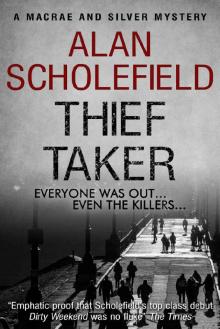 Thief Taker (A Macrae and Silver Mystery Book 3)
Thief Taker (A Macrae and Silver Mystery Book 3)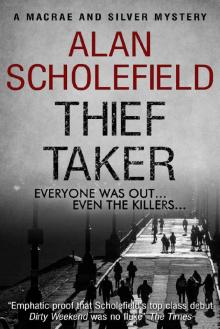 Thief Taker
Thief Taker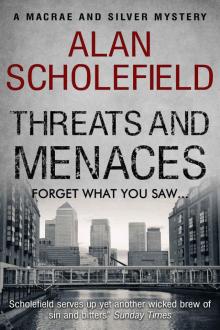 Threats and Menaces
Threats and Menaces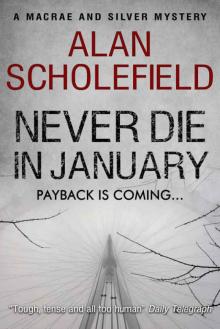 Never Die in January
Never Die in January Venom
Venom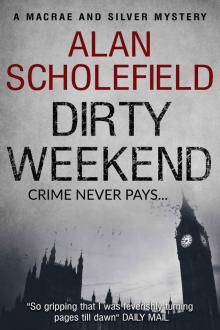 Dirty Weekend (Macrae and Silver Book 1)
Dirty Weekend (Macrae and Silver Book 1) Cat's Eyes
Cat's Eyes Berlin Blind
Berlin Blind The Sea Cave
The Sea Cave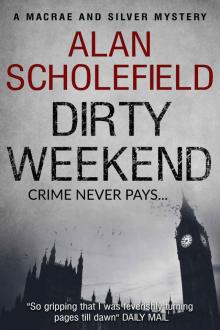 Dirty Weekend
Dirty Weekend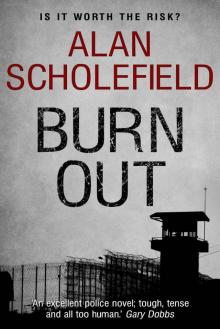 Burn Out (Dr. Anne Vernon Book 1)
Burn Out (Dr. Anne Vernon Book 1)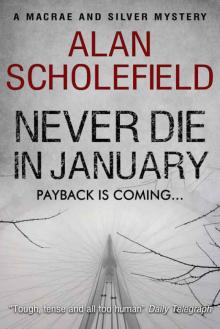 Never Die in January (A Macrae and Silver Mystery Book 2)
Never Die in January (A Macrae and Silver Mystery Book 2)